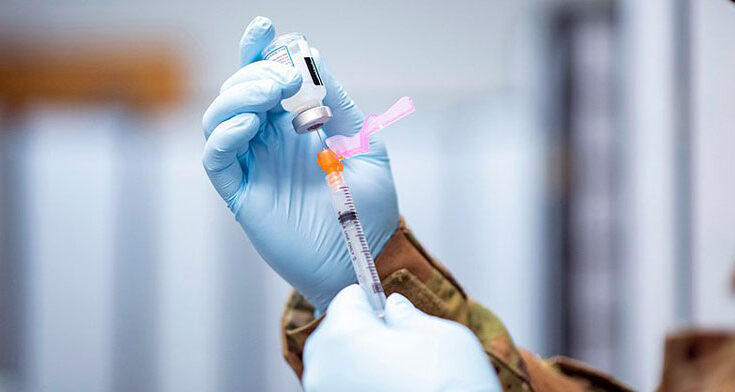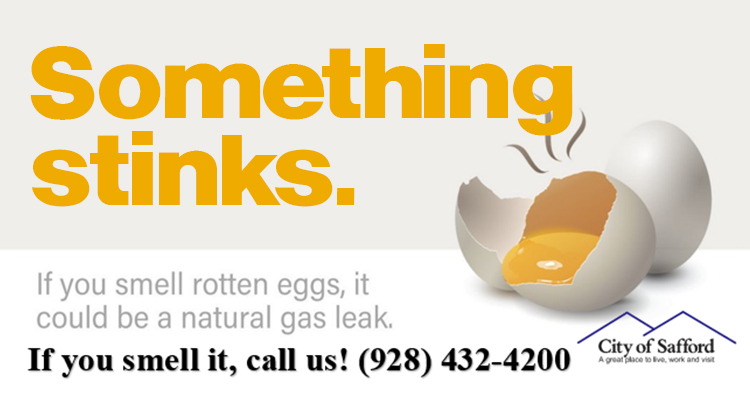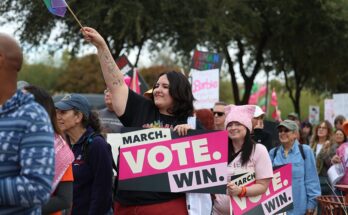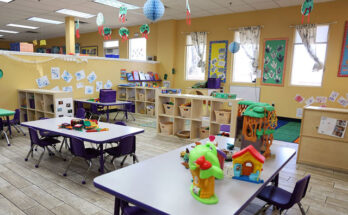Photo By Jacqueline Marshall/Wyoming National Guard: Moderna’s two-dose vaccine for COVID-19 has been approved for adults since December and now the company is running trials of the drug’s effectiveness on children, with one trial to take place in Phoenix. In this January photo, a Wyoming National Guard sergeant draws a dose of the Moderna vaccine for a shot.
By Jacob Holter/Cronkite News
WASHINGTON D.C. – Children from 6 months up to 12 years old could soon start getting the COVID-19 vaccine in Phoenix as part of a trial of the drug’s effectiveness on young people.
Drug-maker Moderna announced this week that Phoenix will be one of the cities where it will test smaller doses of its COVID-19 vaccine, which has currently only been approved for adult use, on preteens. The company has already started trials of the vaccine on teenagers.
While children have proven to be less susceptible to the disease, health experts say it’s important to have the option of a vaccine for younger kids as schools reopen and to improve the odds of “herd immunity” for the overall population.
“The reason we want to make sure that all of these kids get vaccinated is so we can truly achieve herd immunity. We don’t want to have little pockets of people who might be infectious and not be protected,” said Dr. Georges C. Benjamin, director of the American Public Health Association.
The preteen trials were announced Tuesday by Moderna, one of three pharmaceutical companies with vaccines approved for emergency use in adults in the U.S., along with Pfizer-BioNTech and Johnson & Johnson. Moderna and Pfizer vaccines require two doses, while the newer Johnson & Johnson vaccine has a one-dose protocol.
The announcement came the same day that the Arizona Department of Health Services announced that just over 1 million Arizonans have been fully vaccinated against the coronavirus. Overall, the state has administered about 2.6 million doses to a little more than 1.6 million people.
Moderna CEO Stéphane Bancel said in a statement that more than 53 million doses of his company’s version of the vaccine have been administered in the U.S., but “this pediatric study will help us assess the potential safety and immunogenicity of our COVID-19 vaccine candidate in this important younger age population.” The statement said the new trials would take place in the U.S. and Canada.
Dr. Steven Plimpton, the lead investigator for the Phoenix trial, said Tuesday that his office has “already gotten hundreds of calls” from parents interested in getting their children into the trial. He said parents interested in the trial in Phoenix can go to the KidCOVE site for more information or can call 602-368-1928 or 866-913-5454.
One University of Arizona expert said it will likely take a little while to get the trials in motion.
“I would say sometime in the next several weeks, as they get recruitment on board and they have a critical mass to start with and they have all of the aspects of the trial set up in terms of location, staffing, and everything that they need in place,” said Dr. Shad Marvasti, director of public health and prevention at the University of Arizona College of Medicine.
Moderna said that children in the first phase of the trial will receive doses of 25, 50, or 100 micrograms of the vaccine – an adult dose is 100 – depending on their age. Results from that phase will be used to determine dosages in a second phase when come subjects will get a placebo.
Ultimately, Moderna expects to include 6,750 children in the latest trials.
“The adult dose for the Moderna is 100 micrograms, but they are starting with 25 micrograms and then basically watching folks and kids to see how they react,” Marvasti said. “If that looks good and there are no major issues, then they will have a group of kids in the study with 50 micrograms and then if that looks okay they will have another group that has 100 micrograms.”
He added that Moderna’s trust that the vaccine is safe enough to begin trials on kids could have the added benefit of helping to quell vaccine hesitancy among others.
“Hopefully, depending on the results, it will help give people more confidence to get the vaccine, especially if it proves to be as safe and effective in children as it has been in adults,” Marvasti said.
The announcement of the preteen trials also comes as the state has ordered schools to begin to resume in-person schooling, after a year in which most students have attended class virtually.
Benjamin said that with schools reopening, in Arizona and across the U.S., a vaccine for youth would make a definite difference in controlling the virus, as it would prevent kids from spreading it to each other and then bringing it home with them. Vaccination would also expedite kids’ ability to return to normal.
“Getting kids vaccinated, I think, will certainly improve their quality of life and their ability to effectively interact with their friends,” he said.









